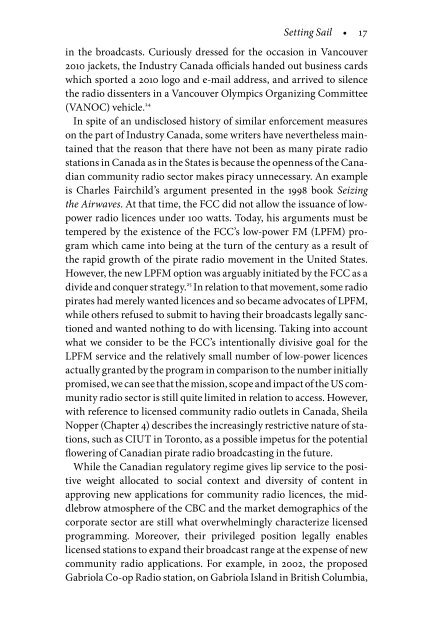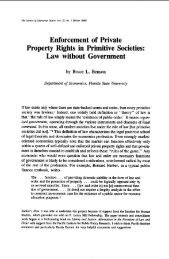Andrea Langlois et al - Islands of Resistance - Pirate Radio in Canada
Andrea Langlois et al - Islands of Resistance - Pirate Radio in Canada
Andrea Langlois et al - Islands of Resistance - Pirate Radio in Canada
You also want an ePaper? Increase the reach of your titles
YUMPU automatically turns print PDFs into web optimized ePapers that Google loves.
S<strong>et</strong>t<strong>in</strong>g Sail • 17<br />
<strong>in</strong> the broadcasts. Curiously dressed for the occasion <strong>in</strong> Vancouver<br />
2010 jack<strong>et</strong>s, the Industry <strong>Canada</strong> <strong>of</strong>fici<strong>al</strong>s handed out bus<strong>in</strong>ess cards<br />
which sported a 2010 logo and e-mail address, and arrived to silence<br />
the radio dissenters <strong>in</strong> a Vancouver Olympics Organiz<strong>in</strong>g Committee<br />
(VANOC) vehicle. 24<br />
In spite <strong>of</strong> an undisclosed history <strong>of</strong> similar enforcement measures<br />
on the part <strong>of</strong> Industry <strong>Canada</strong>, some writers have nevertheless ma<strong>in</strong>ta<strong>in</strong>ed<br />
that the reason that there have not been as many pirate radio<br />
stations <strong>in</strong> <strong>Canada</strong> as <strong>in</strong> the States is because the openness <strong>of</strong> the Canadian<br />
community radio sector makes piracy unnecessary. An example<br />
is Charles Fairchild’s argument presented <strong>in</strong> the 1998 book Seiz<strong>in</strong>g<br />
the Airwaves. At that time, the FCC did not <strong>al</strong>low the issuance <strong>of</strong> lowpower<br />
radio licences under 100 watts. Today, his arguments must be<br />
tempered by the existence <strong>of</strong> the FCC’s low-power FM (LPFM) program<br />
which came <strong>in</strong>to be<strong>in</strong>g at the turn <strong>of</strong> the century as a result <strong>of</strong><br />
the rapid growth <strong>of</strong> the pirate radio movement <strong>in</strong> the United States.<br />
However, the new LPFM option was arguably <strong>in</strong>itiated by the FCC as a<br />
divide and conquer strategy. 25 In relation to that movement, some radio<br />
pirates had merely wanted licences and so became advocates <strong>of</strong> LPFM,<br />
while others refused to submit to hav<strong>in</strong>g their broadcasts leg<strong>al</strong>ly sanctioned<br />
and wanted noth<strong>in</strong>g to do with licens<strong>in</strong>g. Tak<strong>in</strong>g <strong>in</strong>to account<br />
what we consider to be the FCC’s <strong>in</strong>tention<strong>al</strong>ly divisive go<strong>al</strong> for the<br />
LPFM service and the relatively sm<strong>al</strong>l number <strong>of</strong> low-power licences<br />
actu<strong>al</strong>ly granted by the program <strong>in</strong> comparison to the number <strong>in</strong>iti<strong>al</strong>ly<br />
promised, we can see that the mission, scope and impact <strong>of</strong> the US community<br />
radio sector is still quite limited <strong>in</strong> relation to access. However,<br />
with reference to licensed community radio outl<strong>et</strong>s <strong>in</strong> <strong>Canada</strong>, Sheila<br />
Nopper (Chapter 4) describes the <strong>in</strong>creas<strong>in</strong>gly restrictive nature <strong>of</strong> stations,<br />
such as CIUT <strong>in</strong> Toronto, as a possible imp<strong>et</strong>us for the potenti<strong>al</strong><br />
flower<strong>in</strong>g <strong>of</strong> Canadian pirate radio broadcast<strong>in</strong>g <strong>in</strong> the future.<br />
While the Canadian regulatory regime gives lip service to the positive<br />
weight <strong>al</strong>located to soci<strong>al</strong> context and diversity <strong>of</strong> content <strong>in</strong><br />
approv<strong>in</strong>g new applications for community radio licences, the middlebrow<br />
atmosphere <strong>of</strong> the CBC and the mark<strong>et</strong> demographics <strong>of</strong> the<br />
corporate sector are still what overwhelm<strong>in</strong>gly characterize licensed<br />
programm<strong>in</strong>g. Moreover, their privileged position leg<strong>al</strong>ly enables<br />
licensed stations to expand their broadcast range at the expense <strong>of</strong> new<br />
community radio applications. For example, <strong>in</strong> 2002, the proposed<br />
Gabriola Co-op <strong>Radio</strong> station, on Gabriola Island <strong>in</strong> British Columbia,



